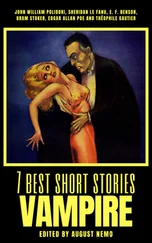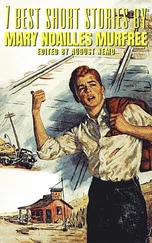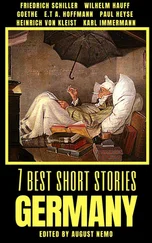
Title Page
Author
The Fascinating Stranger
The Party
The One-Hundred-Dollar Bill
Jeannette
The Spring Concert
Willamilla
The Only Child
About the Publisher


Booth Tarkington was born in Indianapolis, Indiana, the son of John S. Tarkington and Elizabeth Booth Tarkington. He was named after his maternal uncle Newton Booth, then the governor of California. He was also related to Chicago Mayor James Hutchinson Woodworth through Woodworth's wife Almyra Booth Woodworth.
Tarkington attended Shortridge High School in Indianapolis, and completed his secondary education at Phillips Exeter Academy, a boarding school on the East Coast. He attended Purdue University for two years, where he was a member of the Sigma Chi Fraternity and the university's Morley Eating Club. He later made substantial donations to Purdue for building an all-men's residence hall, which the university named Tarkington Hall in his honor. Purdue awarded him an honorary doctorate.
Some of his family's wealth returned after the Panic of 1873, and his mother transferred Booth from Purdue to Princeton University. At Princeton, Tarkington is said to have been known as "Tark" among the members of the Ivy Club, the first of Princeton's historic Eating Clubs. He had also been in a short-lived eating club called "Ye Plug and Ulster," which became Colonial Club. He was active as an actor and served as president of Princeton's Dramatic Association, which later became the Triangle Club, of which he was a founding member. According to Triangle's official history,
Tarkington made his first acting appearance in the club's Shakespearean spoof Katherine, one of the first three productions in the Triangle's history written and produced by students. Tarkington established the Triangle tradition, still alive today, of producing students' plays. Tarkington returned to the Triangle stage as Cassius in the 1893 production of a play he co-authored, The Honorable Julius Caesar. He edited Princeton's Nassau Literary Magazine, known more recently as The Nassau Lit. While an undergraduate, he socialized with Woodrow Wilson, an associate graduate member of the Ivy Club. Wilson returned to Princeton as a member of the political science faculty shortly before Tarkington departed; they maintained contact throughout Wilson's life. Tarkington failed to earn his undergraduate A.B. because of missing a single course in the classics. Nevertheless, his place within campus society was already determined, and he was voted "most popular" by the class of 1893.
In his adult life, he was twice asked to return to Princeton for the conferral of honorary degrees, an A.M. in 1899 and a Litt.D. in 1918. The conferral of more than one honorary degree on an alumnus(a) of Princeton University remains a university record.
While Tarkington never earned a college degree, he was accorded many awards recognizing and honoring his skills and accomplishments as an author. He won the Pulitzer Prize in fiction twice, in 1919 and 1922, for his novels The Magnificent Ambersons and Alice Adams. In 1921 booksellers rated him "the most significant contemporary American author" in a poll conducted by Publishers' Weekly. He won the O. Henry Memorial Award in 1931 for his short story "Cider of Normandy". His works appeared frequently on best sellers lists throughout his life. In addition to his honorary doctorate from Purdue, and his honorary masters and doctorate from Princeton, Tarkington was awarded an honorary doctorate from Columbia University, the administrator of the Pulitzer Prize, and several other universities.
Many aspects of Tarkington's Princeton years and adult life were paralleled by the later life of another writer, fellow Princetonian F. Scott Fitzgerald.
Tarkington was an unabashed Midwestern regionalist and set much of his fiction in his native Indiana. In 1902, he served one term in the Indiana House of Representatives as a Republican. Tarkington saw such public service as a responsibility of gentlemen in his socio-economic class, and consistent with his family's extensive record of public service. This experience provided the foundation for his book In the Arena: Stories of Political Life. While his service as an Indiana legislator was his only official public service position, he remained politically conservative his entire life. He supported Prohibition, opposed FDR, and worked against FDR's New Deal.
Tarkington was one of the more popular American novelists of his time. His The Two Vanrevels and Mary's Neck appeared on the annual best-seller lists a total of nine times. The Penrod novels depict a typical upper-middle class American boy of 1910 vintage, revealing a fine, bookish sense of American humor. At one time, his Penrod series was as well known as Huckleberry Finn by Mark Twain. Much of Tarkington's work consists of satirical and closely observed studies of the American class system and its foibles. He himself came from a patrician Midwestern family that lost much of its wealth after the Panic of 1873. Today, he is best known for his novel The Magnificent Ambersons, which Orson Welles filmed in 1942. It is included in the Modern Library's list of top-100 novels. The second volume in Tarkington's Growth trilogy, it contrasted the decline of the "old money" Amberson dynasty with the rise of "new money" industrial tycoons in the years between the American Civil War and World War I.
Tarkington dramatized several of his novels; some were eventually filmed including Monsieur Beaucaire, Presenting Lily Mars, and The Adventures and Emotions of Edgar Pomeroy, made into a serialized film in 1920 and 1921. He also collaborated with Harry Leon Wilson to write three plays. In 1928, he published a book of reminiscences, The World Does Move. He illustrated the books of others, including a 1933 reprint of Adventures of Huckleberry Finn, as well as his own. He took a close interest in fine art and collectibles, and was a trustee of the John Herron Art Institute.
Tarkington was married to Louisa Fletcher from 1902 until their divorce in 1911. Their only child, Laurel, was born in 1906 and died in 1923. He married Susanah Keifer Robinson in 1912. They had no children.
Tarkington began losing his eyesight in the 1920s and was blind in his later years. He continued producing his works by dictating to a secretary. Despite his failing eyesight, between 1928 and 1940 he edited several historical novels by his Kennebunkport, Maine, neighbor Kenneth Roberts, who described Tarkington as a "co-author" of his later books and dedicated three of them (Rabble in Arms, Northwest Passage, and Oliver Wiswell) to him.
Tarkington maintained a home in his native Indiana at 4270 North Meridian in Indianapolis. From 1923 until his death, Tarkington spent summers and then much of his later life in Kennebunkport at his much loved home, Seawood. In Kennebunkport he was well known as a sailor, and his schooner, the Regina, survived him. Regina was moored next to Tarkington's boathouse, The Floats which he also used as his studio. His extensively renovated studio is now the Kennebunkport Maritime Museum. It was from his home in Maine that he and his wife Susannah established their relation with nearby Colby College.
Читать дальше






![Коллектив авторов - Best Short Stories [С англо-русским словарем]](/books/26635/kollektiv-avtorov-best-short-stories-s-anglo-thumb.webp)










